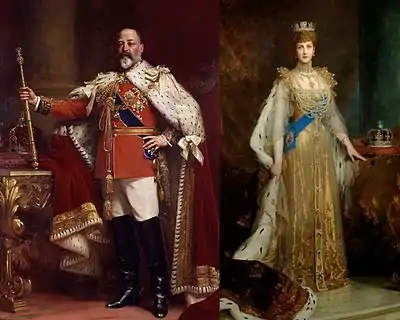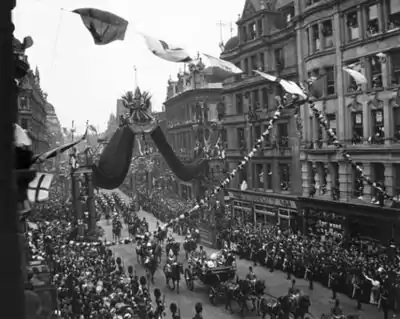August 1902
| << | August 1902 | >> | ||||
|---|---|---|---|---|---|---|
| Su | Mo | Tu | We | Th | Fr | Sa |
| 1 | 2 | |||||
| 3 | 4 | 5 | 6 | 7 | 8 | 9 |
| 10 | 11 | 12 | 13 | 14 | 15 | 16 |
| 17 | 18 | 19 | 20 | 21 | 22 | 23 |
| 24 | 25 | 26 | 27 | 28 | 29 | 30 |
| 31 | ||||||

August 9, 1902: King Edward VII of the United Kingdom and Queen consort Alexandra crowned at Westminster Abbey

Thirty thousand people travel in the procession through London
August 1, 1902 (Friday)
- The Mount Kembla Mine disaster at Wollongong, the worst mining disaster in Australian history, results in the deaths of 96 miners killed by an explosion. A Royal Commission appointed to look into the disaster later states that only the substitution of safety lamps for flame lights could have saved the lives of the victims.[1]
- Raffaele Palizzolo, a former Deputy from Palermo, is jailed for the 1893 murder of banker Emanuele Notarbartolo, former mayor of Palermo, by the Assize Court in Bologna.[2]
- In the UK, the Clitheroe by-election, brought about by the elevation to the Lords of the incumbent Liberal MP, results in victory for Labour Representation Committee candidate David Shackleton, who is unopposed.[3]
August 2, 1902 (Saturday)
- Born: Pope Cyril VI of Alexandria, Coptic Orthodox Patriarch, in Damanhour, Egypt (died 1971)
August 3, 1902 (Sunday)
- Died: August Klughardt, 54, German composer and conductor
August 4, 1902 (Monday)
- Bailundo Revolt: In the Tchipindo area of present-day Angola, Portuguese troops kill a small group of native rebels, including Mutu ya Kavela, a leading counsellor of "King" Kalandula.[4]
- The Belgian ship Wordsworth is wrecked off Assu Torre, Bahia, Brazil.[5]
August 8, 1902 (Friday)
- The Royal Commissions Act 1902, an Australian Act of Parliament, receives Royal Assent, allowing the Governor-General to issue letters patent in the name of the Crown for a Commission of Inquiry.[6]
- Born: Paul Dirac, English physicist and Nobel Prize laureate, in Bristol (died 1984)
- Died: James Tissot, 65, French artist
August 9, 1902 (Saturday)
- The Coronation of King Edward VII and Queen Alexandra takes place at Westminster Abbey, London, after delays caused by King Edward VII of the United Kingdom having to undergo emergency surgery during June. Georges Méliès' film The Coronation of Edward VII (a staged re-enactment containing actuality footage) shown in London that same evening.
- Born: Zino Francescatti, French violinist, in Marseilles (died 1991)
August 10, 1902 (Sunday)
- Japan's general election ends in victory for the Rikken Seiyūkai party, which wins 191 of the 376 seats.[7]
- Born:
- Norma Shearer, Canadian actress, in Montreal (died 1983)
- Arne Tiselius, Swedish chemist and Nobel Prize laureate, in Stockholm (died 1971)
August 11, 1902 (Monday)
- Born:
- Alfredo Binda, Italian cyclist, in Cittiglio (died 1986)
- Lloyd Nolan, US film and television actor, in San Francisco (died 1985)
August 14, 1902 (Thursday)
- The annual Rosenska Pokalen football tournament opens in Stockholm, Sweden.
August 15, 1902 (Friday)
- In the UK, the East Worcestershire by-election, brought about by the appointment of MP Austen Chamberlain to the cabinet as Postmaster General,[8] results in his being re-elected unopposed.
August 16, 1902 (Saturday)
- Born: Georgette Heyer, British novelist, in Wimbledon, London (died 1974)
August 17, 1902 (Sunday)
- India-born Albert De Wilton is appointed Inspector-General of Police and Prisons in British Ceylon.
August 18, 1902 (Monday)
- Born: Adamson-Eric, Estonian artist, in Tartu, under the name Erich Carl Hugo Adamson (died 1968)
August 19, 1902 (Tuesday)
- Born: Ogden Nash, US poet, in Rye, New York (died 1971)
August 20, 1902 (Wednesday)
- Born: Li Fang-Kuei, Chinese linguist, in Guangzhou (died 1987)
August 21, 1902 (Thursday)
- A magnitude 7.3 earthquake strikes the Moro Gulf, Mindanao, Philippines, causing over 100 deaths and substantial damage.[9]
- Taha Hussein's older brother dies from Cholera. "يا لها من ساعة منكرة! هذه الساعة الثالثة من الخميس 21 أغسطس 1902م."
August 22, 1902 (Friday)
- An earthquake of magnitude 7.7 strikes Xinjiang Province, China, resulting in at least 2,500 deaths and considerable damage.[10]
- Theodore Roosevelt travels in a Columbia Electric Victoria automobile through Hartford, Connecticut, the first President of the United States ever to travel by car.
- Asbury Latimer, a candidate in the United States Senate election in South Carolina, assaults rival Democratic candidate John J. Hemphill, while campaigning in the town of Gaffney.
- Born: Leni Riefenstahl, German film director and Nazi propagandist, in Berlin (died 2003)
August 23, 1902 (Saturday)
- US cookery pioneer Fannie Farmer opens her own cookery school in Boston.[11]
August 24, 1902 (Sunday)
- A statue of Joan of Arc is unveiled in Saint-Pierre-le-Moûtier, France, a town she successfully took in 1429.[12]
- Born: Carlo Gambino, New York (US) mobster, in Palermo, Sicily (died 1976)
August 25, 1902 (Monday)
- Born: Stefan Wolpe, German composer, in Berlin (died 1972)
August 26, 1902 (Tuesday)
- In the Democratic primary election for the U.S. Senator to represent the state of South Carolina, William Elliott and John Gary Evans are selected to run off on September 9.
August 27, 1902 (Wednesday)
- The Men's Singles competition at the 1902 U.S. National Tennis Championships is won by William Larned of the USA, who defeats Reginald Doherty of the UK in four sets at the Newport Casino in Newport, Rhode Island.[13]
August 28, 1902 (Thursday)
- King Victor Emmanuel III of Italy and his Minister of Foreign Affairs, Giulio Prinetti, arrive in Berlin for a state visit to Germany.[14]
August 29, 1902 (Friday)
August 30, 1902 (Saturday)
- In Martinique, Mount Pelée erupts, with the resulting pyroclastic flow extending further than the flows of 8 and 20 May 1902, and destroying the settlements of Morne-Rouge and Ajoupa-Bouillon; over 1000 people are killed altogether.[18]
- Henry James's novel The Wings of the Dove is published in London by Constable & Co.[19]
August 31, 1902 (Sunday)
- Died: Mathilde Wesendonck, 73, German poet
References
- "Mt Kembla Colliery Gas Explosion – 1902". illawarracoal.com. Retrieved 22 November 2010.
- Big Blow to The Mafia; Result of the Trial at Bologna Causes Surprise, The New York Times, August 1, 1902
- "Election intelligence". The Times (36836). London. 2 August 1902. p. 10.
- Walker, John Frederick (2004). A Certain Curve of Horn: The Hundred-Year Quest for the Giant Sable Antelope of Angola. pp. 40–41.
- "SS Wordsworth". wrecksite.eu. Retrieved 23 Feb 2016.
- "ROYAL COMMISSIONS ACT 1902 – SECT 2 Power to summon witnesses and take evidence". Austlii.edu.au. Retrieved 23 January 2014.
- Thomas T Mackie & Richard Rose (1991) The International Almanac of Electoral History, Macmillan, p281
- David Dutton, Sir (Joseph) Austen Chamberlain in Oxford Dictionary of National Biography online; 2004–13
- "19020821 PHILIPPINES: MINDANAO: LANAO, COTABATO". National Geophysical Data Center. August 21, 1902. Retrieved November 16, 2015.
- "M7.7 – Kyrgyzstan-Xinjiang border region". United States Geological Survey. August 22, 1902. Retrieved November 16, 2015.
- "Cooking Schools". Historic Cooking Schools. Retrieved 19 February 2017.
- Lester, Meera (2005). Saints' Blessings. Fair Winds. p. 76. ISBN 1-59233-138-6.
- "Larned Beats Doherty" (PDF). The New York Times. August 28, 1903.
- Enthusiasm in Berlin for the King of Italy; He Is Cordially Cheered on His Entry Into the City, The New York Times, August 29, 1902
- (in Italian) La Fonderia del Pignone nel primo sciopero generale di Firenze, by Monica Pacini, ToscaneNovecento (Access date: September 7, 2016)
- Florence Strike Serious, The New York Times, August 31, 1902
- Six Thousand Soldiers Keep Order In Florence; Workmen of Forty Callings Have Joined the Strike, The New York Times, September 1, 1902
- Scarth, Alwyn (2002). La Catastrophe. Oxford. pp. 212–218.
- The Wings of the Dove: Authoritative Text, The Author and the Novel, Criticism edited by J. Donald Crowley and Richard Hocks (New York: W.W. Norton & Company, 2003) ISBN 0-393-97881-8
This article is issued from Wikipedia. The text is licensed under Creative Commons - Attribution - Sharealike. Additional terms may apply for the media files.
